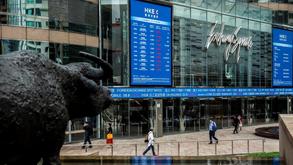 Electronic boards display various stock prices at Exchange Square in Hong Kong on March 9, 2020. (ISAAC LAWRENCE / AFP)
Electronic boards display various stock prices at Exchange Square in Hong Kong on March 9, 2020. (ISAAC LAWRENCE / AFP)
The Hong Kong stock market extended its rally into the second trading day of 2023 as market sentiment gradually improves due to anticipated quarantine-free travel between Hong Kong and the Chinese mainland, the gradual easing of interest rate hikes in the US, and expectations that industry regulation will be normalized in the technology and real estate sectors on the mainland.
The Hang Seng Index on Wednesday jumped 3.2 percent to reach 20,793 points, with a market turnover of HK$149.6 billion ($19.13 billion). The Hang Seng China Enterprises Index soared 3.4 percent to close at 7,065 points, and the Hang Seng TECH Index added 4.6 percent, reaching 4,427 points.
Both A-shares and Hong Kong stocks are expected to achieve double-digit returns this year as the current valuation is still attractive in the medium and long term this year.
China International Capital Corporation
“Both A-shares and Hong Kong stocks are expected to achieve double-digit returns this year as the current valuation is still attractive in the medium and long term this year,” China International Capital Corporation wrote in its research note.
ALSO READ: HK assures public paracetamol supply stable; tally 20,230
“With the gradual easing of the weakening internal fundamentals, external US Federal Reserve’s policy tightening, and geopolitical risks, as well as the reversal of domestic fundamentals, the Hong Kong stock market may have greater recovery flexibility and is expected to outperform A-shares in stages,” CICC said.
US-based Citibank said it expects that the Hang Seng Index may reach 23,000 points this year although more market volatility in the first quarter of this year is expected.
Turning to sectors, financial analysts are particularly bullish on the tourism, technology and real estate industries as listed companies from these segments may register share value revaluation this year.
Kelvin Mo, a senior analyst at Futu Securities, said “with the introduction of the 10 new measures for pandemic prevention on the mainland, the tourism sector may benefit from a revaluation this year. If the mainland further resumes outbound tourism, travel service providers’ income can increase accordingly.”
He is also bullish on the performance of technology and internet stocks as catalysts for valuation recovery are expected this year. “The current valuation of technology and internet stocks has fully reflected the normalization of industry regulation, and since the second half of last year, the mainland has repeatedly emphasized the healthy development of the platform economy and pointed out the real value of the video game industry.
READ MORE: Tender sale of Evergrande's HK headquarters 'fails again'
Regarding traditional blue-chip stocks, Futu Securities’ Senior Analyst Christy Chan said investors should consider adding Hong Kong real estate stocks to their portfolios at the end of the first quarter this year.
“The market expects the pace of interest rate hikes may slow this year, while the resumption of quarantine-free travel between the Chinese mainland and Hong Kong, and the city’s government’s aggressive measures to attract talents may sup-port the property market this year,” Chan said.
Switzerland-based wealth man-ager Credit Suisse, however, said it expects weakening overseas demand and tightening financial conditions with rising funding costs to pose major headwinds for Hong Kong’s equity market performance, and caps the upside for the already low equity market.
Beleaguered by aggressive US interest rate hikes, global energy crises, supply-chain bottlenecks due to COVID lockdowns, and the main-land’s regulatory policies on real estate and technology companies, the Hang Seng Index, the Hang Seng China Enterprises Index, and the Hang Seng TECH Index plummeted 15.5 percent, 18.6 percent, and 24.6 percent, respectively, in 2022.


